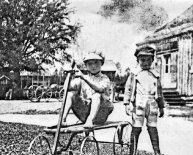
Campfire skits for Boy Scouts California
|
By Linda Formichelli
Homesickness at summer camp is a common ailment, but parents and leaders can help Scouts win the battle, become more independent, and have lots of fun. Tyler is down in the dumps. His stomach hurts, and he’s on the verge of tears. This is his first year to attend summer camp, and now on the second day, all he can think about is heading home. Tyler isn’t used to the sounds of nature at night, he’s missing vital episodes of Nickelodeon’s “Drake & Josh, ” and he’s afraid his friends will call him a wuss if they find out he’s homesick. Tyler misses his home, his bed - and his parents. Finally, Tyler calls his mom and dad on the Scoutmaster’s cell phone and convinces them to come pick him up. With a mixture of shame and relief, he leaves camp. Next year’s camp? Forget it. Ninety-five percent of children between the ages of 8 and 16 who attend a resident camp report some feelings of homesickness on at least one day, says Christopher Thurber, Ph.D., a clinical psychologist who studies homesickness. Twenty percent of those children report moderate-to-severe feelings of homesickness, and 7 percent experience intense homesickness associated with significant symptoms of depression and anxiety. With nearly 412, 000 Boy Scouts attending a long-term camp across the nation, that’s a lot of homesickness! Thankfully, though, there are solutions that will help even the most homesick Scout become a confident camper. Recognize the signs Pinpointing which Scouts are the most likely to get homesick will alert you to signs of problems during camp. It seems almost too simple to be true, but merely asking boys to rate how homesick they expect to be (on a scale of one to 10) is a reliable way to predict homesickness. “They’ll come within a point or two of where they’ll end up being, ” says Thurber. Some Scoutmasters may think asking Scouts to rate their probability of homesickness will create a self-fulfilling prophecy. Not so. “You might worry about creating homesickness, but you’re not creating anything that wasn’t there before, ” says Thurber. “The sooner you identify it, the better.” Another predictor of homesickness is if a boy has little experience away from home: If he rarely goes on overnight trips without his family, he may have trouble adjusting at camp. A third tip-off is if the camp is culturally different from the Scout’s home life. For example, if he lives in the city, he’s used to hearing cars whoosh by at night - not to hearing crickets and raccoons (or was that a bear?). A boy who is used to sleeping in during the summer and playing Xbox all day may have trouble adjusting to scheduled activities and early morning wake-up calls. Prepare them for camp The best way to help kids who show signs of being homesick-prone - and even those who don’t - is to prepare them for the camp experience before trekking into the wilderness. First, Thurber recommends that parents encourage trial separations from home, such as sleepovers at friends’ houses or overnight trips to grandma’s. Next, leaders should familiarize their Scouts with the camping experience before leaving home to help reduce culture shock. “Drill down minute by minute, ” suggests Michael Lanning, a California estate-planning lawyer and Scoutmaster of 54 years. “For example, tell them that they’ll get up at 7 a.m., and clean their tent, then they’ll go to breakfast. Let them know when they are scheduled to go to the handicraft area and make a souvenir. And don’t forget to mention the fun they’ll have with skits and songs at the evening campfire.” In addition, if your Scouts haven’t been physically active and will be hiking several miles every day, get them used to wearing boots and packs before camp. “You have to take practice hikes, ” says Lanning. “Tell the Scouts to break in their boots by wearing them to school. Plan short Saturday jaunts, where the boys walk uphill for half an hour and then back wearing their packs.” Playing up what the boys can expect at camp can help head off homesickness, says Thurber. Sell your Scouts on going to camp the way you’d sell an adult on a vacation destination. Hand out your local Scout council’s camp brochures that show photographs and list camp activities. “Boy Scout camps schedule free-time activities that can lessen thoughts of homesickness, ” says Lanning. These activities include shooting at the rifle and archery ranges, swimming, and canoeing. “There’s always an exploration or hike the boys can join. Handicrafts are terrific for homesick Scouts because they can focus on what they are making.” Other strategies for coping with homesickness include talking to an adult leader, keeping a journal of fun camp experiences, bringing self-addressed, stamped envelopes from home to write letters to mom and dad, and marking off days on a calendar to show how fast the days at camp are going. Parents need as much prepping about camp as their sons. Set up a parents meeting a few weeks before camp and explain to them your expectations and how they can help their sons minimize homesickness. Coach your Scouts’ parents to avoid saying things like, “I don’t know what I’ll do without you, ” “I hope I remember to feed your dog, ” and “I remember my first camp experience - we ate mystery meat!” |

















